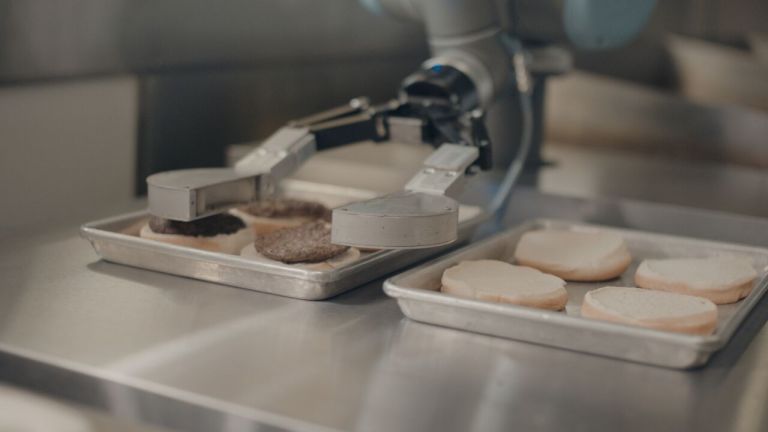Pasadena, California-based startup Miso Robotics is ready to introduce Flippy, the automated fast-food burger-flipper — and, according to many, the beginning of the end for burger boys and maybe even for low-skill laborers in general. Flippy is slated to roll out to 50 CaliBurger restaurants around the world over the next two years.
Miso’s burger bot can flip burgers twice as fast as a human using its singular arm, and it is powered by deep machine learning — meaning it can use feedback loops to learn from its coworkers in the kitchen as well as from its own mistakes.
So, while Flippy is just an assistant today, still requiring human hands to cut veggies and place cheese on burger patties, those are skills it could theoretically learn (and which a similar robot by Momentum Machines already has), one day fully taking the place of its $15-per-hour kitchen comrades.
Flippy’s creators aren’t denying their robot will destroy jobs. In fact, the company almost seems proud of it, drawing ire from proponents of a $15 minimum wage.
“The kitchen can be entirely automated,” Miso Robotics CEO David Zito has said. “We really think of ourselves as a technology company that happens to sell cheeseburgers.”
Of course, on the flip side, this burger bot also has the potential to save quick service restaurants (QSRs) a lot of money in labor costs, particularly as the technology becomes more prevalent and affordable. It’s also likely to make fast casual orders more predictable and consistent, as well as more sanitary — and we can all think of at least one QSR chain that could use a robot like that.
Advertisement: Scroll to Continue
Zito also believes no robot can ever replace the human touch and expertise of a chef.
“Tasting food and creating recipes will always be the purview of a chef,” he said. “Restaurants are gathering places where we go to interact with each other. Humans will always play a very critical role in the hospitality side of the business…”
The march of progress is likely inexorable, but just for fun, here’s a look at some of the pros and cons of automating kitchen labor.
Pros:
Raise your hand if you order your burger “medium” even though you want it “medium rare,” because you just never know what you’re going to get — and better a slightly tough burger than one that’s still mooing when it gets to you.
A robotic chef could eliminate that uncertainty and inconsistency to deliver exactly the burger you ordered, every time. Flippy monitors the temperature of burger patties as it cooks them to ensure each one is heated to industry standards. That serves the dual purpose of delivering a consistent product that matches the customer’s expectations, while also increasing food safety by meeting regulations.
Speaking of food safety, machines — although not Flippy, at least not yet — can detect pathogens in real time to help reduce contamination of food either by employees or something in the kitchen environment.
Cons:
Tech fans are often quick to point out that innovation creates new jobs to replace the ones it destroys. Automation doesn’t reduce the number of jobs, they claim — it just changes what types are available. Instead of burger-flippers, the restaurant industry will need engineers, management, installation and system support.
However, that’s not the picture the trends are painting, according to a January 2016 study by the World Economic Forum titled “The Future of Jobs: Employment, Skills and Workforce Strategy for the Fourth Industrial Revolution.”
“The global workforce is expected to experience significant churn between job families and functions,” says the study, predicting a gain of 2 million jobs in computer, mathematical and engineering-related fields, though tied to a loss of 7.1 million which are concentrated largely in white collar office settings. After all, automation could replace administrative roles.
All told, that’s 5.1 million jobs lost globally between 2015 and 2020 — so while there will be new jobs in tech support, data analysis, et cetera, the overall net impact is likely to be severe.
Pro? Con? We’re Not Sure What To Make Of This
Could Flippy be among the firstborn in an age of human history when — bear with us, here — work will be outdated, all people will receive a universal basic income and humankind will be free to pursue the self-fulfillment that resides at the top of Maslow’s hierarchy of human needs? There are some who think so.
“The human condition is deeply problematic,” said Ben Goertzel, an AI researcher and entrepreneur who spoke at the annual Web Summit in Lisbon last year. “But as super-human intelligent AIs become one billion-times smarter than humans, they will help us solve the world’s biggest problems. Resources will be plentiful for all humans, work will be unnecessary and we will be forced to accept a universal basic income. All the status hierarchies will disappear and humans will be free from work and be able move on up to a more meaningful existence.”
An interesting perspective, if a bit Utopian for most, yet even proponents of such a grandiose view recognize the onset of automation in the workplace will likely make things worse before it makes them better.
“A lot of bad things will happen before things get good,” said Goertzel. “All jobs are going to be lost to AI eventually, but once we get to the other side, human existence and the human condition will be improved.”




